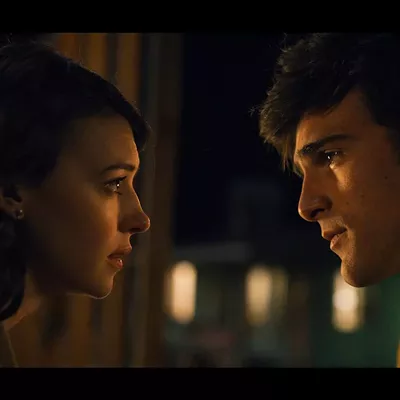On the surface, the 2014 scandal over racist remarks made by Los Angeles Clippers owner Donald Sterling doesn't seem like it would sustain a six-episode narrative miniseries. But Clipped creator Gina Welch smartly explores all the issues raised by the Sterling incident, while delivering nuanced portrayals of the real people involved. Although it occasionally feels padded, Clipped is consistently gripping, with a quartet of fantastic lead performances and sharp, often funny dialogue.
Based on the ESPN 30 for 30 podcast The Sterling Affairs, Clipped begins with narration from V. Stiviano (Cleopatra Coleman), the very personal "assistant" to Sterling who was depicted in the media as a gold-digging social climber. That's not necessarily an inaccurate assessment, but Clipped finds the tragic longing in V's position, as she attempts to compensate for a troubled childhood by finding external validation and becoming the stable provider she never had.
Clipped provides origin stories for V's eye-catching public behavior, including her penchant for bizarre face-covering visors, but also shows her in the process of adopting two foster children, boys she genuinely cares about and wants to nurture. With the Kardashians as a constant background presence on TV and social media, the series also recognizes that for a certain type of woman, chasing reality-TV fame may seem like the only route to a prosperous, fulfilling life. When Sterling (Ed O'Neill) chastises the mixed-race V for being photographed with Black people, he's expressing the implicit point of view of the entrenched white, moneyed establishment.
He's also being recorded by V, which is what sets off the entire scandal. Despite the salacious undertones of their relationship, V truly is Sterling's assistant, and she records their conversations ostensibly as a means of reminding this oblivious old man of things he's agreed to do. When Sterling's equally privileged wife Shelly (Jacki Weaver) gets fed up with the expensive gifts that Donald is giving V (including a duplex to house her family), she files a lawsuit to retrieve what she believes is community property. A hurt V leaks a recording to TMZ where Sterling rants against V's public association with "minorities," including NBA legend Magic Johnson.
The leak comes just as new coach Doc Rivers (Laurence Fishburne) is turning around the Clippers' reputation as perhaps the most hapless team in the NBA, even securing them a spot in the playoffs. Rivers himself is a consultant on Clipped, so it's no surprise that Rivers comes across as the only main character with anything resembling sense, despite occasional missteps. He's still a complex character, reckoning with his position as a highly paid Black employee of a man notorious for treating Black players like expensive personal pets. At least Rivers is less compromised than longtime Clippers president Andy Roeser (Kelly AuCoin), whose dedicated sycophancy ultimately gets him nowhere.
Series creator Welch keeps Clipped focused on backstage intrigue. There's maybe 10 minutes of actual basketball-playing across the six episodes. Clipped owes more to movies like Moneyball and Steven Soderbergh's High Flying Bird than to a typical sports drama, and whether the Clippers win or lose their games is almost incidental, relevant only in how it reflects their response to Sterling's now-public insults against his players.
That backstage intrigue is fascinating, and Clipped emphasizes the NBA as a cultural and financial institution, whose influence extends far beyond the court. Sterling is a reprehensible narcissist whose decades of wealth hoarding as a real estate mogul have taught him that he's insulated from any consequences, and he's largely correct. It requires a direct recording of clear, unambiguous racist language to take him down, and even then most of the Clippers players don't believe that he'll actually be punished.
Those players are the weak link in Clipped, with thinly sketched individual details that seem to assume audiences will fill in the gaps based on their existing fame. That's only a minor issue, given how strong a presence Fishburne provides as Rivers, who sees it as his responsibility to navigate the response to the scandal so that the players can focus on basketball. A midseason flashback episode mostly offers details that have already been implied, but it's powerful when showing a young Rivers, himself then a player for the Clippers, dealing with the racial politics of the 1992 Los Angeles riots.
Fishburne is excellent at portraying a man of principle who knows just how far standing up for his principles will get him, but O'Neill, Weaver and Coleman are excellent as well, playing much less principled people whose motivations come down to money and power. Weaver strikes an especially difficult balance as Shelly, who sometimes seems like the long-suffering wife of a monster, but has made her own decisions about where her allegiances lie, and can be just as ruthless and conniving as her husband. As V, Coleman gives this tabloid caricature real depth, even if her choices often seem pathetic.
By the end of its six episodes, Clipped has told an entertaining story with surprisingly far-reaching implications about race, wealth and fame in America, without ever having to leave the bounds of the specific Sterling scandal. ♦



















